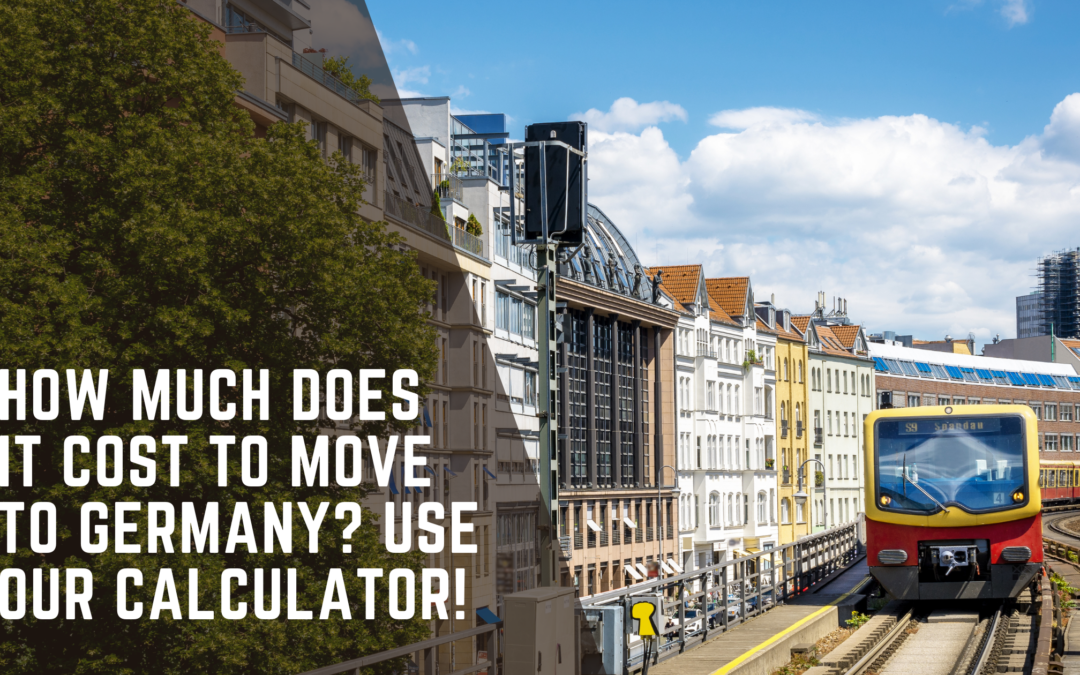HOW MUCH DOES IT COST TO MOVE TO GERMANY?
This is a question that comes up for anyone thinking about moving to Germany. There are many different costs to consider, like travel, moving, flat, furniture, visa, and other miscellaneous things. Aside from the typical costs, you also need to think about savings to cover moving home expenses should you need to leave the country suddenly or if you’re coming to Germany on a job seeker’s visa, having enough cash on hand to cover your expenses until you find work.
As everyone’s economic and personal situation differs, there is no set amount or “magical formula” that will tell you just how much it costs to move to Germany. For example, people may arrive in Germany alone and others will come with their spouse and children. Some are more affluent and will want to live in a large, centrally located, penthouse. Certain German cities are more expensive than others, with Frankfurt and Munich being more pricey than Berlin. Car enthusiasts will go so far, as to ship their vehicles to Germany. As you can see, there are multiple factors that influence just how much money you need to move to Germany meaning that it’s no easy feat to determine a precise financial figure that will cover both expected and unforeseen costs. However, you can figure out an approximate amount by knowing what you need to consider.
To help you plan your finances and a budget that works for you, The Berlin Life is now offering this FREE Move To Germany Calculator. The calculator will ensure you have a realistic and comfortable financial plan in place before making your big move, ensuring a smoother and less stressful relocation experience.
We also recommend reading our other, Moving To Berlin guides for even more information about how to move to Berlin. Start with The Most Detailed Moving To Berlin Guide Out There to get in-depth information on everything from neighborhood guides, to recommendations for mobile phone providers, and where to sign-up for a bank account.
Join Our Community
“Can I just say, even though I live in Munich and am not looking for a job – I LOVE your newsletter. Anyone who is a German expat should sign up for it – a lot of value, humanity, and humor in there.”
- Eleanor, Munich
Get the latest news on immigration developments, employment opportunities, and other updates about life in Germany. Gain valuable insights, early access to Berlin Life guides, invites to community events, and more.
Don't miss out - subscribe today.

HOW MUCH DOES IT COST TO MOVE TO GERMANY?
Before using the calculator, review this primer explaining the details of the various costs you need to think about when moving to Germany.
1) Traveling Costs
1) Flight – If your flight is already booked, include the cost below. Don’t forget to include additional expenses like luggage fees, seat bookings, meals, etc. Our calculator is in Euros and if the price of your flight isn’t in Euros, use xe.com to complete the currency conversion. Google also works well for this too – simply search for something like “Convert Canadian dollars to Euros” and a handy conversion tool will pop up.
If you haven’t booked your flight yet, use Google flights (or your preferred travel booking site) to price out an approximate cost. Note, one-way flights tend to be on the expensive side so it’s sometimes better to book a return flight, even if it’s way out in the future. Then you already have your first visit home booked!
2) Travel insurance – This is an entirely optional purchase of course, but if the pandemic and 2022’s travel chaos taught us anything, we should always expect the unexpected. I’d highly recommend getting travel insurance to cover any unforeseen events, like your flight being canceled or changed at the last minute, you getting ill or even injured, your luggage being lost, etc.
We’ll leave it up to you to choose the travel insurance that’s right for you, but World Nomads tends to be popular and a company I’ve used myself. Whatever provider that you end up choosing, be sure to read the fine print of their policies and go with a company that covers coronavirus-related events.
3) Other transportation – Perhaps you’re taking the train to Berlin or are driving to Germany in your own car, or even a rental. Here you can add in the relevant costs for your train ticket, taxis, gas, etc.
2) Moving Costs
1) Shipping – The total cost to ship your belongings to Germany, be it boxes, furniture, or even your car.
Same as with insurance companies, we’ll also leave it up to you to choose a shipping company that works best for your situation. We do want to give a shoutout to one company though – if you’re only shipping suitcases or boxes, I can personally recommend Send My Bag. They offer top-notch customer service, live tracking of your shipment, and more.
We’ve unfortunately noticed that during the pandemic and beyond, along with the dramatic rise of inflation, shipping costs have increased dramatically, as have related delivery times. The sooner you can ship your stuff, the better.
Another item to note is that whatever you ship to Germany, might be subject to import taxes. I moved to Berlin twice and during my first move, when I shipped it by British Airways Cargo, I didn’t pay any import tax. For my second move, I sent it by ship and the import taxes cost me more than the shipping fees! Ask your shipping company up front as to what to expect and consider this a possible unplanned item to budget for.
2) Moving – The total cost to move your items to your new home in Germany. Perhaps you’ve shipped your belongings to Germany, but the shipping company doesn’t cover delivery to your new home. You’ll need to hire movers to transport everything. You could be moving from another European country and have hired movers to drive everything over. Perhaps you rented a big truck and are moving everything yourself. Whatever your situation, include moving costs here.
3) Mail forwarding – It’s likely you’ll want to have important documents from your home country sent to Germany. Factor in the relevant costs here. For example, I used Canada Post’s mail forwarding service when I first came to Berlin. As I still have financial interests in Canada (even years later), I now use Your Canadian Address, a service that provides me with a Canadian address where I can receive mail. The service notifies me whenever I receive a new letter and offers me options to have it couriered to Germany or even scanned/emailed. If you’re moving from another part of Germany, Deutsche Post offers mail forwarding services as well.
3) Flat Costs
1) First month’s rent – For those who are renting a short-term flat, taking on a sublet, or will be living in student housing, include the monthly price here.
A convenience of booking a short-term flat is that the rental fee is usually inclusive, with things like internet, heat, and electricity already being taken into account. As finding a flat in Germany can be difficult and time-consuming, a lot of newbies rent short-term flats from companies like Wunderflats or Spot A Home until they find more permanent lodgings.
For those who’ll start living in their permanent home right away, there’s a lot more to think about. When you list your rental costs in our calculator, you need to specify the total rent including both warm and cold costs.
Cold rent (Kaltmiete) includes the base rental price before other expenses. Warm rent (Warmmiete) includes an estimated amount of additional costs (Nebenkosten). Additional costs vary but can include water and heating costs, as well as fees for communal property services like trash removal or general property upkeep.
At the end of every year, your building’s property management firm and/or landlords will review actual expenses incurred and calculate that against what everyone individually already paid in warm rent. You could be eligible for a refund or find out you owe them money and it could even result in your warm rent being reduced or increased for the following year. This financial review process is usually quite timely and you may receive copies of the financial statement 9-12 months later. For example, I received my 2020 Nebenkosten in September 2021 and even then, it was several more months before I received my refund.
As energy costs in Germany are higher than in most other places around the world, we recommend being mindful of your hot water, heat, and electricity consumption. Frequent long showers and baths or leaving the heat turned on full blast will contribute to a high end-of-year bill. Read our guide about how to save energy in Germany.
If you’re moving into a WG, talk with your future roommates about how you’ll split the varying costs.
If you don’t have a flat yet, browse the short-term websites we mentioned above, as well as Immowelt, Immobilien Scout, and Immonet to get an idea of approximate costs and enter that in the calculator.
2) Security deposit
When moving into a new flat whether a WG or your own space, you’ll also need to provide a security deposit which can be up to three months of cold rent. It’s important to note that the security deposit is in addition (!) to your first month’s rent. There’s no such thing as “first and last month’s rent” like in North America and this means you need to provide a serious amount of cash upfront.
Say your total rent, including warm and cold costs is €1000 per month. Of that €1000, €850 is for cold rent and €150 for your warm rent. Your security deposit would equal €2,550 (€850 * 3). The good thing is that you don’t need to pay the security deposit all at once. By law, you’re permitted to pay it monthly, in a maximum of three installments. In the example provided above, you could opt to pay €850 per month for three months. Landlords cannot force you to pay the security deposit all at once, so be sure not to let them pressure you into doing so.
Building further on the example above, you’d owe €3,550 upon moving in, including €1000 for the first month’s rent and €2,550 for your security deposit. If you opted to pay the rent and the entire security deposit all at once, you’d pay €3,550 in the first month, and going forward, the normal rent amount. If you opted to pay the rent and the security deposit in three installments, you’d pay €1,850 a month for the first three months and starting in month four, the normal rent amount.
For the purpose of the calculator below, simply enter the total security deposit for the entire three months.
4) Furniture Costs
More fun for those getting their own unfurnished flat or even a room in shared WG? Aside from having to buy typical things like a new couch or bed, there’s more you may have to think about when setting up your new living space. People moving here are often stunned to find that most flats in Germany don’t have basic amenities like lighting or a kitchen.
You’ll walk into a bedroom and find wiring sticking out from the ceiling. Yes, you need to install a light fixture on your own, and often, not even a light bulb will be supplied. You’ll enter the kitchen and find it completely empty, save for hookups for water and such, but no appliances like a fridge or stove, and in some cases, not even cupboards. That’s your responsibility and one reason why IKEA kitchens are so popular in Germany. You’ll usually need to buy your own washing machine as well.
When people move out, it’s expected that you take your kitchen and all of your appliances with you. In many cases, previous tenants may offer to sell you their stuff.
There are still unfurnished flats out there that will come equipped with appliances and full kitchens. It should usually be specified in the listing and if it doesn’t seem clear, ask the landlord before signing any contracts. Know that if the former tenant tries to get you to buy their kitchen, you’re not obligated to do so and they will be responsible for removing the kitchen in its entirety.
Between the rent and security deposit alone, moving into a new flat is a really expensive endeavor. Furnishing a flat, especially when a new kitchen is required, is another heavy investment. We recommend giving yourself a healthy budget for this, whether buying new or used.
If you want everything new, you can price out potential costs for things like couches and washing machines by checking out IKEA, Home 24, MediaMarkt. If you want some help decorating your flat, consider Nomads At Home.
If money is an issue, come up with a list of the essential items you’re going to need to get started. You can always build your home up more over time. You can also rent furniture from places like Lyght Living as an interim measure.
We also recommend buying used, as not only does it save you money, it’s better for the environment. Flea markets are common in Germany for finding unique and even, vintage pieces. You can also buy things, or score them for free, on sites like Craigslist and eBay Kleinanzeige.
Facebook is popular with more than just the Boomers here and groups like Free Your Stuff Berlin or Sell Your Stuff Berlin are another great way to find items. As people are often moving and desperate to rid themselves of their possessions, you’ll be able to quickly and easily furnish your flat on a shoestring budget.
Obviously, you’ll need to pick the items up by yourself and factor in related transportation costs as well.
5) Visa Costs
1) Translation – When applying for a visa in Germany, whether a blue card, student, or spouse visa, you’ll need to supply a number of documents, and many times, the visas will need to be officially translated by a certified translator. While yes, you can find someone on Fiverr, we recommend veering on the safe side and using professional companies like Berlin-based Red Tape Translation or Berlin Translation Center. Check out their websites, get in touch for a quote, and enter the related amount in the calculator.
2) Processing fees – Thankfully, processing fees for visas are usually not too expensive. For example, the first time a blue card is issued, the fee is €100. Visa fees are usually listed on official websites for your location, like Berlin.de or Frankfurt.de.
3) Money in the bank – Certain visas like job-seeking visas require proof that you have money in the bank to show that you can survive in Germany without being a burden on the state. Youth mobility requires you anywhere from €1,200 – €4,000 in the bank for example. If applicable, enter the related fees in the calculator. As with above, the related requirements will be listed on the service portals of the city or state where you’re moving.
4) Health or travel insurance – Some visas like the youth mobility visa require that you purchase health or travel insurance before coming here. Whatever option you go with, the insurance should cover medical expenses, as well as repatriation costs. Again, this requirement is in place to ensure you won’t be a burden on the state should something happen to you. To ensure your visa is approved, it’s usually best to purchase a one-year policy. One of our favorite providers is Feather Insurance. Get a quote from their website and enter the costs below.
If you’re moving to German to be a freelancer or start your own company, you’ll be on the hook to pay for health insurance yourself. Based on your personal situation, you’ll need to decide if you want to go the public or private route. Most people choose public health insurance, myself included. Popular public health insurance providers are TK, AOK, SBK , and Ottonova are great for those who want to go private. Private health insurance is often attractive to younger people who want to work independently and are not looking to stay in Germany long-term due to the lower monthly premiums.
For more information on how health insurance in Germany works, read our informative German health insurance guide.
If you’re coming to Germany to work in a permanent full-time position, there is no need to note health insurance costs in the calculator. You can choose a provider once you get here and once you’ve signed up and notified your employer, it will be automatically deducted from your monthly salary.
6) Miscellaneous Costs
1) Warm Clothing – If you’re coming from a cold place like me (I’m Canadian), you don’t need to worry about this item. But for those who grew up in a tropical climate, the cold German winters can be especially harsh. You’re going to need a warm winter jacket, hats, scarves, gloves, boots, etc. So be sure to budget this when planning your move. You can already check out options and pricing with Zalando to calculate a high-level cost.
2) Medication – This is something that a lot of people don’t think about when planning their move to Germany. Not all medication will be available here, and it may take time to find a doctor who can prescribe exactly what you need. So stock up (enough for a few months, if not more) and bring it with you.
3) Emergency Funds – Something may happen that requires you to briefly return home for an emergency, or worse yet, requires you to move home permanently. Some people move here and can’t find work before their job seeker visa runs out and others may lose their job during probation and might not find a new one before their allowance to stay in Germany expires. As a new resident of Germany, you won’t be eligible for unemployment until you’ve made contributions to the system for at least 12 consecutive months within the last 30 months.
We recommend having enough money for a flight home, related insurance, moving and shipping costs, paying out financial obligations on contracts, etc. For example, when I moved to Germany for the first time, I bought a new iPhone and opted to pay in monthly installments. Upon leaving Germany a year later, I had to pay the remaining balance in full and it wasn’t cheap.
On top of this, having at least three months’ worth of living expenses in the bank is highly recommended. If you’re going to be moving to Berlin, we recommend looking at our post about the cost of living in Berlin (it also includes a handy calculator).
Another item to take into account when leaving Germany is that it may take weeks, or even months to get your security deposit back. Read more about it over on EXBERLINER.
Before you go, give our guide about how to save money in Germany a read. It’s full of useful tips to help you save on cash once you move here.
OUR FREE MOVING TO GERMANY CALCULATOR
After having read the above, use this calculator to figure out just how much you’re going to need to move to Germany.
For added convenience, save your quote and it will be emailed to you as a PDF. Once you know more about your moving costs, come back and use the calculator again for an updated quote.
Be sure to use the Email Quote feature to get a summary of the costs emailed to you. Bookmark this page as you gather more information on your moving costs, so you can come back and use the calculator again.
What do you think about our guide to how much it costs to move to Germany? Tell us about it in the comments.
RELATED CONTENT
A Moving To Berlin Guide – Move Here & Settle In Like A Local
This moving to Berlin guide will help you settle in like a local. We cover finding a flat, kita, getting a bank account, SIM card, and more.
Top Relocation Companies In Berlin Germany
Moving abroad can be an overwhelming experience. Use this list of top relocation companies in Berlin Germany to make your move stress free.

Cheryl Howard, Founder @ The Berlin Life
Hi, I’m Cheryl. My mission is to help you move to Berlin and find work.
A Canadian in Berlin for 10+ years, I have the unique experience of moving to Berlin – not once, but twice. During my time in Berlin, I’ve had five different visas and worked as both a freelancer and a permanent employee for numerous Berlin companies. I even managed to find a new job during the pandemic and again in 2023, during Germany’s recession and massive layoffs in tech.
My day job has involved work as a hiring manager, overseeing the recruitment of countless people, as well as a team coach helping teams and individuals work better and find happiness in their careers. Through my side projects, I’ve also shared my personal experiences by publishing a series of helpful blog posts, creating a thriving community of job seekers, and hosting events to help people find work in Berlin. In 2021, I decided to put my coaching and recruiting talents to use by creating The Berlin Life, bringing my existing content and community together in one spot.
The combination of my personal and professional experience means I know exactly what it takes to move to Berlin and find work.




Hi Cheryl,
Would like to know if you can help in getting a job in Germany. I studied Agronomy in Nigeria and have practiced Oilpalm plantation for more 12 years.
Hi Adeniyi! Thanks for your comment. We always advise everyone to start by reading through our career guides. There is plenty of info there about finding work in Germany. If you need more help, check out our services page.